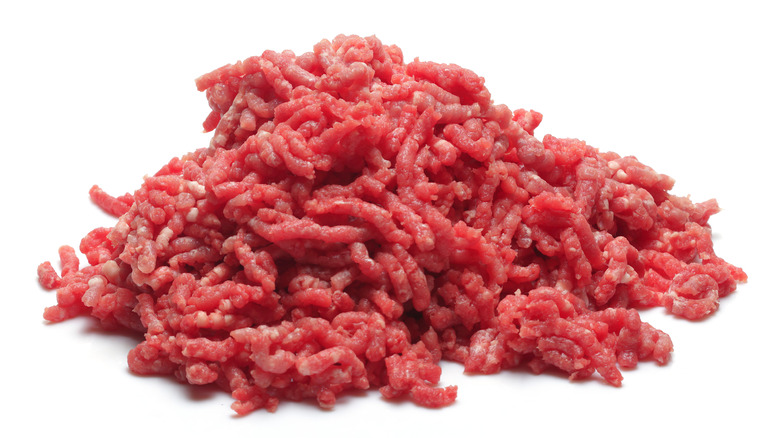The Massive Amount Of Cows Your McDonald's Burger Meat Could Come From
As plant-based proteins gain acceptance in the U.S. fast food market, with burger chains like Carl's Jr, Shake Shack, and Burger King now offering vegan-friendly menu items, the future of the U.S. meat industry looks increasingly uncertain. Quick service industry leader McDonald's gave a vote of confidence to plant-based foods earlier in 2021, signing a three-year global contract with Beyond Meat (via Eat This, Not That!).
A system-wide pivot at Mickey-D's towards vegan alternatives is still a ways off, with the chain's "McPlant" line currently unavailable in U.S. markets. Still, they couldn't have gotten the ball rolling at a better time: Vegan alternatives are becoming popular, with a recent 2021 study predicting that the plant-based global market will reach a $21.23 billion value by 2027 (via PR Newsire).
It's also worth noting that McDonald's move towards plant-based foods is also a move away from animal protein — and the ethical concerns endemic to the meat industry. McDonald's complicity in these concerns has been a topic of public conversation since at least 2012, when the chain came under fire for its use of a controversial beef byproduct, "boneless lean beef trimmings," also known as "pink slime," according to ABC. Now, in the context of McDonald's move towards plant-based protein, it is worth revisiting a 2015 Washington Post article that posed a difficult question about McDonald's 100% beef patties.
100% beef, split 100 ways
In 2015, a columnist at the Washington Post asked themselves an odd question: "How many cows went into the average U.S. hamburger?" they wondered. The question — which they recall asking midway through eating a hamburger — may have been inspired by a press release issued by McDonald's U.K. the previous year, in which the company confirmed that batches of beef used to make its hamburgers were "made up of the meat from more than 100 cattle." In fact, the practice seems to be common across the food industry, with representatives for companies including Costco and Giant admitting in interviews with the Washington Post that they did not know the number of cows sourced per batch of their ground beef.
But the fact that most ground beef is made up of multiple cows shouldn't bother anyone, the article goes on to argue. According to Peter Singer, a Princeton professor of bioethics, multi-sourcing ground beef is at least as ethical as single-sourcing. "I don't think ethically it ought to make much of a difference," he told the Washington Post. "Whether one person eats a substantial part of one animal or a small part of a dozen or even hundred, in the end, they're all getting consumed." Whatever the case, there may be something to be said for gut reactions, and if McDonald's slow move towards plant-based protein is any indication, lots of people are going with their gut.

